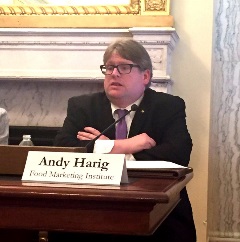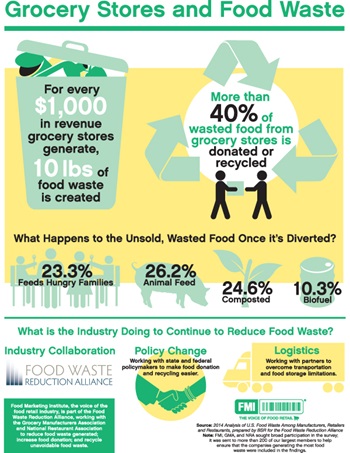Feeding Hungry Americans = Priceless
JUN 27, 2016
When you’re in the business of feeding people, the idea of “food waste” can’t help but leave you feeling a little sick to your stomach. A lot goes into that: Wasted water, energy, and effort; and quality food ending up in landfill. From an environmental, efficiency and hunger viewpoint this is a disaster.
When you look beyond these feelings, however, there is also a powerful business case for addressing food waste. This was a clear message that I, as a representative of the Food Waste Reduction Alliance (FWRA), addressed last week at a U.S. Senate staff briefing on our collective industry efforts to acknowledge and better steward our precious resources.
Food that ends up in landfill is money down the drain for a low-margin industry. Food retail is a game of fractions and even though the individual aspects of a food waste reduction program can seem limited, cumulatively the effect can be significant. Obviously, the best first step is source reduction – preventing the waste from being generated. To the extent that this leads to leaner, more efficient supply chains, companies are creating savings.
Even when waste is inevitable, finding ways to address it more effectively than simply tossing it out can help mitigate costs, such as creating food donation programs that allow retailers to take advantage of incentives like the food donation tax credit. A number of retailers are also taking advantage of anaerobic digesters to help generate energy to run distribution centers or even selling the leftover product as fertilizer. Food waste mitigation that reduces tipping fees and the cost of removal can offer real value.
 The food retail industry isn’t waiting on change – we’re proactively creating a movement with FWRA. The single most important thing all three sectors have taken away from the effort is measuring and tracking our waste output. The measuring process can be really high tech – with the use of big data analytics, etc. – but it can also be the ultimate in low tech: simply dumping out a trash bin before it goes out to the dumpster and seeing what is in there and why.
The food retail industry isn’t waiting on change – we’re proactively creating a movement with FWRA. The single most important thing all three sectors have taken away from the effort is measuring and tracking our waste output. The measuring process can be really high tech – with the use of big data analytics, etc. – but it can also be the ultimate in low tech: simply dumping out a trash bin before it goes out to the dumpster and seeing what is in there and why.
We’re also addressing impediments to this revolution, namely the lack of infrastructure – right now retailers are at the mercy of the availability of local composting and biofuels facilities in their area.
While there’s a business case, addressing food waste also offers the opportunity to help generate more donations and feed more hungry people. Even if there wasn’t a single dollar at stake in our efforts, the prospect of feeding more people and having fewer hungry Americans would make the effort worth it in FMI members’ eyes.

No comments:
Post a Comment